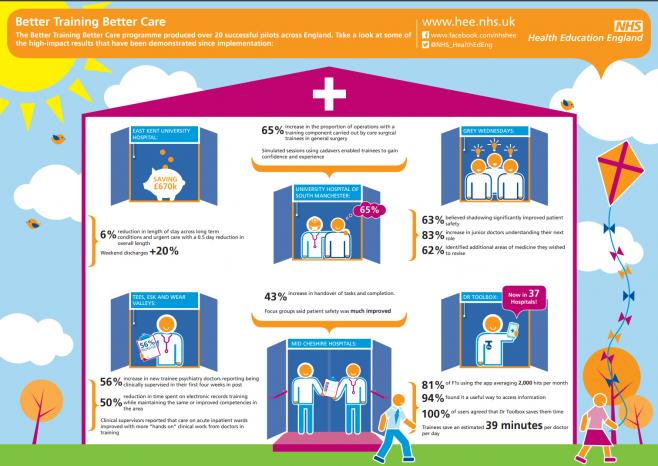You are here
Better training better care
Contents
Delivering key recommendations from Sir John Temple’s Time for Training and Professor John Collins’ Foundation for Excellence, the BTBC programme improved the quality of training for the benefit of patient care
Phase one of the programme – which closed at the end of March 2014 – consisted of two workstreams:
- Workstream one involved 16 local NHS trusts implementing pilot projects for medical education and training. An independent evaluation report was commissioned jointly with NHS Employers through Matrix Knowledge, which showed that the pilots demonstrated a positive impact on doctors in training, trainers, patients and services. The report showed that integrating training within service delivery, improved patient care and encouraged the spread and adoption of good practice across the healthcare system.
- Workstream two focused on the trainee led Inspire Improvement projects, with evidence strongly supporting the link between high quality training and improved patient safety. Stakeholders continue to show considerable interest in the shared learning, promotion of innovation of change and multi-professional working that has been demonstrated through this workstream.
Two evaluation reports for the BTBC programme were published on 16 January 2015, The Matrix Knowledge Report and Evaluation of the National Elements.

Phase 2 – referred to as national spread and adoption – aimed to share learning across the NHS by promoting the spread and adoption of the projects that were implemented in workstreams one and two.
Through collaborative working with partner organisations, trusts, trainers and trainees, we can use the learning from the BTBC programme to provide a framework to promote and improve better training and better patient care. Change that is supported from the bottom-up, where innovation and learning is encouraged, and resources and funding is shared.
To support this, we developed a series of toolkits to enable other trusts to use the learning and implementation strategies from these projects to make it easier to implement one or more of these changes. These projects have been linked collectively to a series of themes that have been identified through engagement exercises as commonly identified problems, and will act as a navigation tool to enable staff to identify projects across areas that they are trying to improve. Eight themes were identified and are as follows:
- change and empowering employees
- front door/A&E
- handover
- improving training programmes and pathways
- mental health
- multi-professional team working
- out of hours care (24/7)
- rotas and scheduling